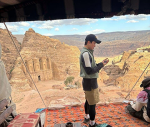You are here
The death of a great Arab ambassador to the world
May 18,2016 - Last updated at May 18,2016
It is bitterly ironic that my dear friend Clovis Maksoud should die on the day marking the 68th Palestinian Naqbeh and the day before the 100th anniversary of the secret Sykes-Picot treaty dividing between Britain and France Arab lands freed from Ottoman rule and promised independence.
It is ironic because Clovis was among the last of the high-profile warriors who continue to seek justice for Palestinians and remain dedicated to the cause of Arab unity and freedom.
He was 10 years old in 1936 when Palestinians observed a national strike to protest Britain’s policy of encouraging and facilitating colonisation by Zionists from Eastern Europe.
The strike lasted from April until October and initiated a three-year uprising, an Intifada forgotten by all but history buffs.
Palestinian political historian Walid Khalidi estimated that more than 5,000 Palestinians were killed by the British while another 1,200 died in Intifada-related violence and 14,750 were wounded.
Clovis was studying at the American University of Beirut (AUB) in 1944, the year Britain restricted the immigration of Jews to Palestine and Zionist extremists assassinated in Cairo Lord Moyne, the British minister of state for the region.
During 1948, the turbulent year of the Nakbeh and the first Arab-Israeli war, Clovis graduated from AUB and went to George Washington University in the US, where he earned a law degree.
At the time of the tripartite — British, French and Israeli —aggression against Egypt in October-November 1956, Clovis was back in Beirut.
The Israeli invasion of Sinai and the Anglo-French assault on Egypt, designed to regain control of the nationalised Suez Canal, shocked Clovis and boosted his commitment to the twin causes of Palestine and Arab unity.
Following the Suez war, he went to New Delhi to work for the Arabic service of All India Radio, an assignment that familiarised him with India and may have led to his appointment in 1961 by the Arab League as its ambassador to India and Asia.
During his five years there, Clovis became a close friend and confidant of Indira Gandhi, daughter and aide of Prime Minister Jawaharlal Nehru and president of the ruling Congress Party.
Their friendship deepened India’s already firm commitment to the Palestinian cause, originally made by Mahatma Gandhi, and strengthened Arab ties with this leading non-aligned nation.
When he left India, Clovis became senior editor of Al Ahram, the Arab world’s most influential newspaper and Arab nationalist mouthpiece.
Israel’s 1967 attacks on Egypt, Jordan and Syria, and occupation of the Palestinian West Bank, East Jerusalem and Gaza delivered a mortal blow to the Arabs and ushered in 49 years of political turmoil and warfare.
Following the 1973 war, the first mounted by the Arabs against Israel, the Arab League sent Clovis to Washington to put the Arab case to the movers and shakers within the “Beltway”, the ring road that surrounds Washington DC, the “nation’s capital”.
He also travelled across country to speak to the public about Arab affairs and Palestine.
Clovis married Hala Salam, niece of two Lebanese prime ministers, Saeb Salam and Rashid Karameh, in 1974, the year the league recognised the Palestine Liberation Organisation as the sole representative of the Palestinian people.
In 1975, the UN General Assembly adopted a resolution declaring “Zionism is a form a racism and racial discrimination,” in spite of vigorous opposition from Israel’s friends, particularly the US, which managed to marshal enough votes to revoke the resolution in December 1991.
Clovis was elevated to the post of league ambassador to the US and United Nations in 1979, the year Cairo signed its separate peace treaty with Israel, removing the largest Arab army from the regional confrontation with Israel.
Since then Israel has exploited the absence of Egyptian military deterrence to mount war after war on neighbouring Lebanon, Clovis’ homeland, and carry out army operations in Iraq and Syria.
Deeply discouraged by the Arab failure to secure a peaceful end to the Iraqi invasion of Kuwait in 1990 and the US determination to wage war on Iraq, Clovis resigned from the league and took up academic positions at American University in Washington where he headed the Centre for the Global South.
Hala had taken her master’s and doctoral degrees at Georgetown University and began teaching both there and at George Mason University.
As much an activist as Clovis, Hala joined and chaired the American-Arab Anti-Discrimination Committee and played leading roles in the American Committee on Jerusalem and the Committee for the Preservation of Palestinian Heritage.
After she died of pancreatic cancer at 56, in April 2002, the Centre for Contemporary Arab Studies at Georgetown established the “Clovis and Hala Salam Maksoud Chair in Arab Studies”.
My final meeting with Clovis, whom I had known since the 1960s, was last May when we had lunch, along with a friend of mine, at one of his favourite restaurants in Washington.
Driven to our meeting place by his housekeeper, Clovis, pale and physically fragile, mounted the steps to the restaurant with difficulty.
But once we were seated at a corner table, he was his usual forceful self, joking and analysing the situation in the region he loved and where he perhaps could not live.
He had been working on the English version of his memoir, which I understand, unfortunately, he did not complete, when he died.
He still had a great deal to reveal about the Arabs, their troubles and the distant countries that continue to intervene in this region at great cost to the Arabs.













